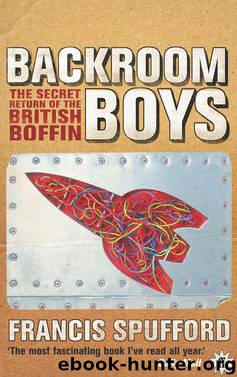Backroom Boys by Francis Spufford

Author:Francis Spufford [Francis Spufford]
Language: eng
Format: epub
ISBN: 9780571266449
Publisher: Faber & Faber
Published: 2010-01-10T05:00:00+00:00
Kkkhhrrr … Two kilos to pick up, John, at North kkhhrrr. Do you copy, John? … Say again, please, control. Say again, over? … Kkhhrrr …
The men in the van worked for Racal, pronounced ‘Raycle’, one of the military electronics companies that had been left standing when the first Thatcher recession shredded all the consumer electronics manufacturers in Britain. But Racal was a defence contractor with a difference. It had begun as a breakaway by a bunch of Plessey engineers, and it deliberately went against the traditional cost-plus way of doing military business that held at Plessey – and at Ferranti, GEC and British Aerospace too. Instead of winning a government contract, building a product without worrying much about the cost and then charging the government the cost plus a profit margin on top, Racal designed products to a price and then sold them aggressively all over the world. Racal didn’t get contracts to build radios for the British Army, but it designed a backpack field radio that Arab sheikhdoms and African dictatorships could afford. Where other field radios used expensive metal casings, Racal’s radio used plastic, sprayed with a thin metallic film. The competitors would have liked to believe that Racal’s stuff was cheap and nasty. Plessey got hold of a Racal field set, a former Plessey engineer told me. They fiddled with it: it still worked. They cooked it, they froze it: it still worked. They took it up to the top of one of the two towers at the Plessey HQ in Ilford and threw it off. Now its corner was crushed in. They turned it on. It still worked.
Racal lived and died by its sales, not by having an intricate webwork of connections to the procuring departments of Her Majesty’s Government. Paradoxically, this meant that Racal had exactly the right credentials in 1982 when the Thatcher government invited applications for two licences to run Britain’s first ever public mobile telephone services. Two licences, please note. In every other European country, the incumbent state phone company got a head start at mobile. There were going to be two networks from the outset in Britain. The Thatcherites didn’t believe in industrial policy but they swore by competition policy. They wouldn’t intervene to make things happen, or to offer goals to industry, but they’d step in purposefully to disrupt any set-up where they felt the magic of the market wasn’t getting its full chance. One of the licences was automatically going to go to British Telecom, that was understood. But the other was up for grabs, and the criteria in the application document were gloriously vague, this first time round, what with the whole idea being so new and untried, leaving the government free to pick a sympathetic candidate, not just an adequate one. Racal was not an obvious choice. It had no experience of customer service (unless the customers were Third World armies). Whoever won would have to invest tens of millions of pounds in their network before they saw a penny of revenue.
Download
This site does not store any files on its server. We only index and link to content provided by other sites. Please contact the content providers to delete copyright contents if any and email us, we'll remove relevant links or contents immediately.
| Africa | Americas |
| Arctic & Antarctica | Asia |
| Australia & Oceania | Europe |
| Middle East | Russia |
| United States | World |
| Ancient Civilizations | Military |
| Historical Study & Educational Resources |
Room 212 by Kate Stewart(5119)
The Crown by Robert Lacey(4814)
Endurance: Shackleton's Incredible Voyage by Alfred Lansing(4781)
The Iron Duke by The Iron Duke(4354)
The Rape of Nanking by Iris Chang(4211)
Joan of Arc by Mary Gordon(4109)
Killing England by Bill O'Reilly(4001)
Say Nothing by Patrick Radden Keefe(3984)
I'll Give You the Sun by Jandy Nelson(3447)
Shadow of Night by Deborah Harkness(3367)
Hitler's Monsters by Eric Kurlander(3342)
Mary, Queen of Scots, and the Murder of Lord Darnley by Alison Weir(3210)
Blood and Sand by Alex Von Tunzelmann(3203)
Eleanor & Park by Rainbow Rowell(3172)
Darkest Hour by Anthony McCarten(3131)
Margaret Thatcher: The Autobiography by Thatcher Margaret(3082)
Book of Life by Deborah Harkness(2938)
Red Famine: Stalin's War on Ukraine by Anne Applebaum(2933)
The One Memory of Flora Banks by Emily Barr(2863)
